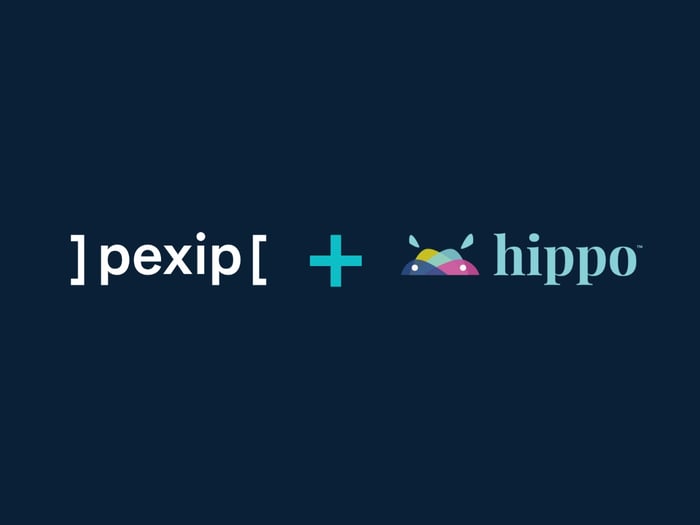Virtual Care leader Hippo is leveraging Pexip to enable increased interoperability and integration with multiple third-party remote collaboration platforms
HERNDON, Va., October 5, 2022 – Hippo Technologies, Inc., a global virtual care company delivering solutions for healthcare and medical education, announced today a partnership with Pexip, the leading videoconferencing technology provider, to develop and launch a next-generation Virtual Care platform for Healthcare and Life Sciences.
Unlike traditional telehealth, which is generally suitable for simple primary care consultations, the Hippo Virtual Care™ solution combines hands-free, voice-activated, wearable headsets at the point of care with a clinical-grade platform to deliver a “through the eyes of the clinician” viewpoint. This allows first responders, healthcare workers at a rural clinic, or caregivers at home to live stream their activity to specialist colleagues for real-time consults on complex cases. This immersive virtual care experience increases access to specialty care in rural areas and results in faster diagnosis and treatment, ultimately improving patient outcomes and reducing the overall cost of care.
Leveraging Pexip’s Infinity backbone, the Hippo Virtual Care platform will now offer interoperability with various third-party videoconferencing solutions, including Microsoft Teams, Zoom, Google Meet, and Cisco Webex. This simplifies the joining experience for participants and allows clinicians to quickly enter the call from their solution of choice, enabling faster access to care.
Hippo’s Chief Technology Officer, Ivan Lumala, who has been leading Hippo’s product development, says, “The beauty of the Pexip system is that they do all the processing on the server side, rather than using point-to-point connections. This makes it ideal for low network and reduced bandwidth situations, such as a clinician in the field in a rural location, where connectivity to a central care team can be critical. We also chose Pexip because of their flexible, open architecture and open APIs, allowing us to build future features and functionality quickly, and their interoperability with electronic medical records such as Epic, allowing for the easy data exchange between healthcare providers.”
Hippo and Pexip are also partnering to scale the market for next-generation XR (extended reality) and remote collaboration solutions, with a decision-support workflow designed specifically for healthcare delivery and medical education.
“By simultaneously connecting physician specialists in the hospital and clinicians in the field with an immersive experience, Hippo Virtual Care enables advanced remote collaboration to deliver the right diagnosis and treatment the first time, every time,” says Dr. Patrick Quinlan, CEO and Co-founder of Hippo Technologies, Inc. “Our partnership with Pexip is integral to our mission to serve patients and those who care for them by leading the transformation to next generation Virtual Care for healthcare providers and educators, expanding access to clinical expertise whenever and wherever it’s needed.”
“Pexip is incredibly excited to announce this strategic partnership with Hippo Technologies, Inc. The global Virtual Care platform that the Hippo team has developed on Pexip technology is groundbreaking, and we believe will be fundamental in supporting our health-focused customers and partners to drive improved patient outcomes and deliver enhanced patient care.
The platform’s intuitive interface allows organizations to embrace the latest in wearables, extended reality, and digital technology. It also seamlessly integrates with organizations’ existing collaboration or patient record software such as EHR systems like Cerner or Epic, or existing video platforms from Pexip, Microsoft Teams, or Zoom,” says Leighton Hughes, VP of Global Business Development & Innovation, Pexip.
Hippo has Virtual Care deployments across diverse clinical settings, including the US, UK, China, Canada, Guatemala, Nigeria, Uganda, and South Africa. Launching the new Hippo Virtual Care platform will enable Hippo to address many remote specialty care needs enabling more efficient and better-quality care delivery, particularly in underserved and rural communities.
For more information on Hippo Technologies, Inc., and Hippo Virtual Care, please visit www.myhippo.life. To learn more about Pexip’s video platform and how to build your solution using Pexip, please visit pexip.com/build.
About Hippo Technologies, Inc.
Hippo Technologies, Inc., is a global virtual care company servicing the healthcare and medical education industries. The next-generation Hippo Virtual Care™ platform combines the most advanced voice-activated, Assisted Reality headsets and clinical-grade software, allowing clinicians to collaborate remotely in real-time to deliver patient care or train healthcare professionals. In addition to supporting the delivery of specialist care in the field, Hippo can integrate seamlessly with hospital systems and connected devices for many use cases in the hospital ER, OR, ICU, inpatient wards, outpatient clinics, long-term care facilities, and in the home.
With staffing shortages and clinician burnout taking their toll on the healthcare workforce after COVID-19, Hippo’s solution effectively overcomes the barriers of time, distance, and training to deliver specialist care wherever the patient is located. For more information on Hippo Technologies, Inc. and Hippo Virtual Care, please visit myhippo.life.
About Pexip | pexip.com
Pexip is a video communication platform that empowers large enterprises and public sector organizations to transform their interactions with video. Pexip's unique core technology provides simplified collaboration for connected spaces, privacy, business continuity for secure spaces, and customized connections for innovative video applications.
The solution is sold through over 300 channel partners in 75 countries and used in 190 countries. Pexip was listed on the Oslo stock exchange in May 2020.
- Healthcare
- Video Platform



.png?width=500&name=Copy%20of%20Blog%20header%20(1).png)

-1.jpg?width=500&name=iStock-1290753047%20(1)-1.jpg)